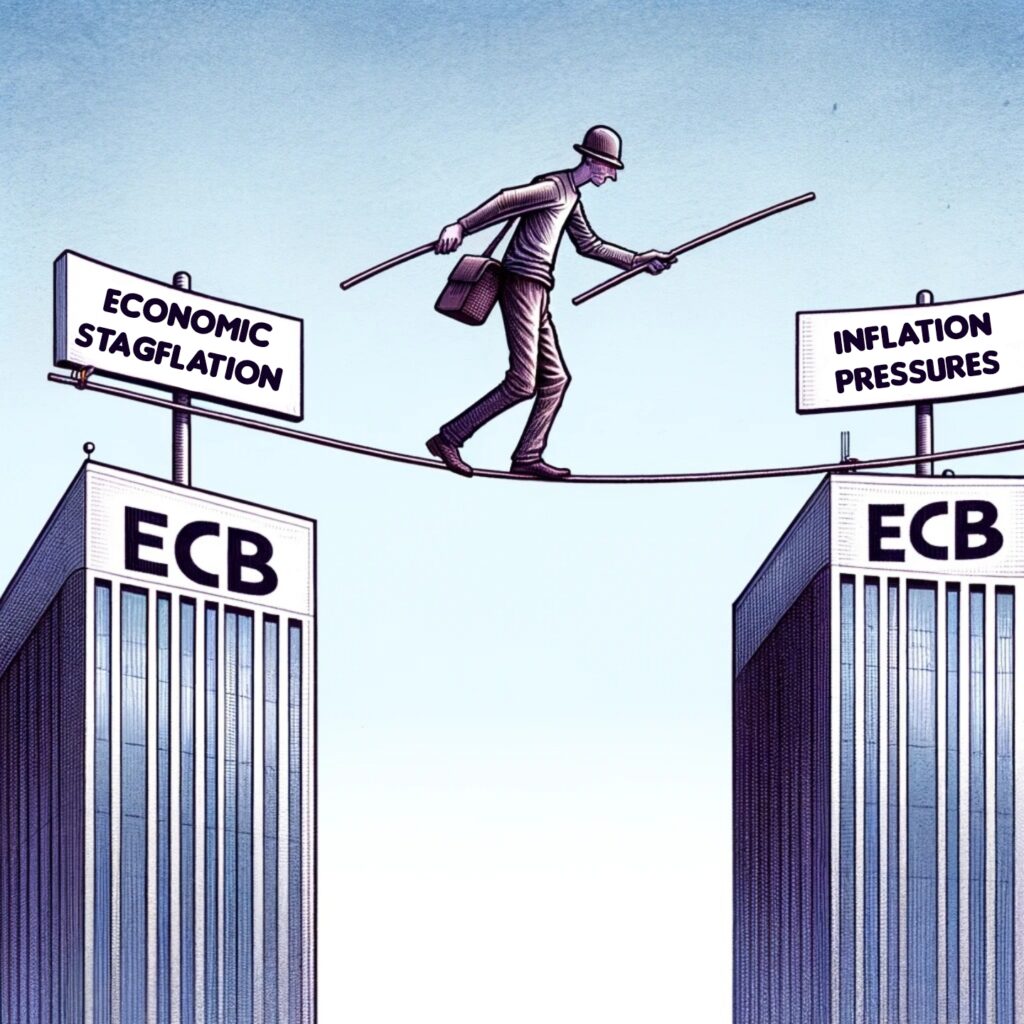The ECB’s Delicate Dance with Rates: Navigating Economic Stagnation Amid Inflationary Pressures
By the Digital Zeitgeist Geopolitical and Financial Analyst based in the UK
The Intersection of Geo-Political Tensions, Economic Growth, and Central Banking
The End of an Era
The European Central Bank’s (ECB) unprecedented run of ten consecutive interest rate hikes drew to a close this week, leaving the key rate poised at a historical 4%. This aggressive rate-raising regime, commencing in July 2022, represented a stark reversal, ushering rates into positive territory after a decade-long lull.
The Inflation Conundrum
With the Israel-Hamas war triggering perturbations in oil markets, there is a looming shadow over the ECB’s optimistic inflation projections. The bank, however, remains adamant about its medium-term outlook, with an anticipated inflation rate of 2.1%. Despite this seemingly calm forecast, the recent trajectory of inflation has been far from placid. The ECB’s statement revealed a notable decline in inflation in September. The curious blend of persistently high inflation and its recent drop poses significant policy challenges for the central bank.
“Inflation is still expected to stay too high for too long, and domestic price pressures remain strong,” the ECB noted.
While the market had largely anticipated the decision to maintain the current rates, due to strong indications from the ECB’s previous meetings, there’s no denying that the bank’s decision is fraught with implications.
Balancing Act: Growth vs Inflation
Germany, once regarded as the economic dynamo of the European Union, now faces stagnation. With the broader European economy predicted to grow at a mere 0.7% in 2023, expanding to just 1% in 2024, the ECB’s task of navigating monetary policy becomes even more daunting.
Marcus Brookes, the Chief Investment Officer at Quilter Investors, highlighted the predicament aptly:
“Given the stagnating economy and the fact other central banks have moved into a holding pattern, something very unexpected would need to happen for rates to be raised again. The pressure will quickly shift to cutting rates given the lack of economic growth.”
The Consumer’s Plight
As central bankers grapple with the macroeconomic landscape, hundreds of thousands of homeowners face a more immediate concern. According to consumer rights group, Which?, nearly half a million homeowners are on the cusp of concluding their fixed-term deals this Christmas season. With the ongoing cost-of-living crisis, this could spell a significant hike in monthly repayments for these individuals, amplifying the financial strain on households.
Which? emphasises the importance of proactive communication:
“Those concerned about how they will repay their mortgage should contact their lender straight away – and doing so will not affect your credit score. Options may include extending the term of your mortgage, only paying the interest on your deal or taking a temporary payment holiday – and the most suitable will depend on individual circumstances.”
Global Implications and the Path Ahead
The ECB’s decisions do not operate in a vacuum. A global bond market sell-off, causing a sharp rise in yields, mirrors the challenges central banks face worldwide. The fine line between tackling inflation and supporting economic growth is a global dance, with potential missteps carrying hefty consequences.
The persistent volatility in the Middle East, particularly the escalating Israel-Hamas conflict, casts further uncertainty, especially concerning energy prices. The intertwining of geo-political instability with financial markets might spell unpredictable shifts in the global financial system.
Conclusion: The Economic Tightrope
The ECB, like many central banks globally, is walking a tightrope. Balancing the twin objectives of economic growth and price stability is a formidable challenge. The added dimension of geo-political tensions only complicates the task. As households, businesses, and governments navigate these uncertain times, the decisions of institutions like the ECB will play a pivotal role in shaping the global economic narrative in the coming years.
Disclaimer: The views and opinions expressed in this article are those of the author and do not necessarily reflect the official policy or position of GPM-Invest or any other organisations mentioned. The information provided is based on contemporary sourced digital content and does not constitute financial or investment advice. Readers are encouraged to conduct further research and analysis before making any investment decisions.

